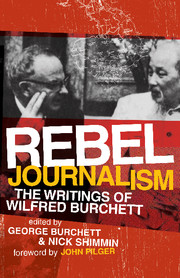Book contents
- Frontmatter
- Contents
- List of Photographs
- Acknowledgements
- Foreword by John Pilger
- Foreword by Gavan McCormack
- Introduction
- 1 The Atomic Plague [1945]
- 2 With Mick Griffith to the Plaine des Lacs [1941]
- 3 Who is Wingate Anyway? [1944]
- 4 The Trial of Cardinal Mindszenty [1951]
- 5 Liberty in Eastern Europe [1951]
- 6 The Microbe War [1953]
- 7 Koje Unscreened [1953]
- 8 The Ball-Point Pen Murders [1954]
- 9 South of the 17th Parallel [1955]
- 10 Front-Line Village [1959]
- 11 Welcome Home [1961]
- 12 Gagarin: The First Interview with Western Journalists [1961]
- 13 Virgin Lands [1962]
- 14 Lilac and Outer Space [1962]
- 15 War Against Trees [1963]
- 16 The Tragedy of South Vietnam's Ethnic Minorities [1964]
- 17 Interview with General Vo Nguyen Giap (April 13, 1964)
- 18 A Fortified Hamlet [1965]
- 19 Patriots & Mercenaries [1965]
- 20 At Ground Level [1966]
- 21 A Spurned Olive Branch [1967/1977]
- 22 Personal Leader [1968]
- 23 The Tet of Peace [1973/1977]
- 24 ‘Something from Nothing’ Township [1976]
- 25 Evaluating the Past [1976]
- 26 Mercenaries: British Export Model [1977]
- 27 The Geneva Conference [1978]
- 28 How to be a Good Khmer Rouge [1981]
- 29 China Prepares to Attack Vietnam [1981]
- 30 Afterword [1983]
- Notes
- Bibliography
- Index
10 - Front-Line Village [1959]
Published online by Cambridge University Press: 22 September 2009
- Frontmatter
- Contents
- List of Photographs
- Acknowledgements
- Foreword by John Pilger
- Foreword by Gavan McCormack
- Introduction
- 1 The Atomic Plague [1945]
- 2 With Mick Griffith to the Plaine des Lacs [1941]
- 3 Who is Wingate Anyway? [1944]
- 4 The Trial of Cardinal Mindszenty [1951]
- 5 Liberty in Eastern Europe [1951]
- 6 The Microbe War [1953]
- 7 Koje Unscreened [1953]
- 8 The Ball-Point Pen Murders [1954]
- 9 South of the 17th Parallel [1955]
- 10 Front-Line Village [1959]
- 11 Welcome Home [1961]
- 12 Gagarin: The First Interview with Western Journalists [1961]
- 13 Virgin Lands [1962]
- 14 Lilac and Outer Space [1962]
- 15 War Against Trees [1963]
- 16 The Tragedy of South Vietnam's Ethnic Minorities [1964]
- 17 Interview with General Vo Nguyen Giap (April 13, 1964)
- 18 A Fortified Hamlet [1965]
- 19 Patriots & Mercenaries [1965]
- 20 At Ground Level [1966]
- 21 A Spurned Olive Branch [1967/1977]
- 22 Personal Leader [1968]
- 23 The Tet of Peace [1973/1977]
- 24 ‘Something from Nothing’ Township [1976]
- 25 Evaluating the Past [1976]
- 26 Mercenaries: British Export Model [1977]
- 27 The Geneva Conference [1978]
- 28 How to be a Good Khmer Rouge [1981]
- 29 China Prepares to Attack Vietnam [1981]
- 30 Afterword [1983]
- Notes
- Bibliography
- Index
Summary
At the 1954 Geneva conference to end the conflicts in Korea and Indochina the world suddenly discovered that Indochina was in fact three distinct countries inhabited by people of different races and cultures, each with its own individual language and writing. Though Burchett wrote much more about Vietnam, he produced two books about Cambodia and Laos, Mekong Upstream and The Second Indochina War. The former, written in 1957, combines Burchett's eye for the exotic with his political insights.
His Introduction states that ‘the main purpose of this book is to introduce Cambodia and Laos, their people and their leaders, to those who, like the author, only recently discovered them, but who sympathise entirely with their aspirations to build up a new life in peace and free from outside interference or threats of interference. The book is the fruit of three visits to Cambodia and Laos, during which the author was an eyewitness to the vigorous way in which the peoples of these countries – each in their own way – resisted the attempts to reshackle them with the fetters of colonialism.’
* * *
By the time we had reached the outskirts of the village, women were seated at their weaving frames under the houses or at their spinning wheels on the platforms which project from all Lao Lum homes. The track climbed steeply.
- Type
- Chapter
- Information
- Rebel JournalismThe Writings of Wilfred Burchett, pp. 105 - 114Publisher: Cambridge University PressPrint publication year: 2007



